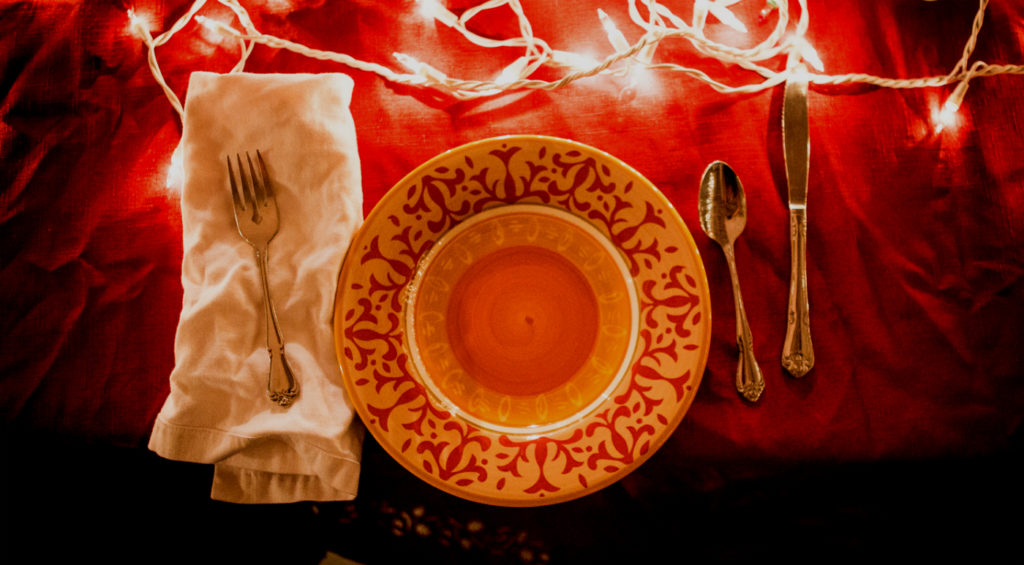With a Meal at the Heart of Worship, a Church Connects with Creation

After graduating from Harvard Divinity School in 2014, Zach Kerzee received the support of the United Methodist Church to start a new church in Grafton, Massachusetts. The church centers its community life and worship around a meal shared at tables every Thursday evening. The food for the meal comes from an organic farm next door. Through this and other practices, the church has helped pioneer a unique and innovative approach to ministry. I interviewed Kerzee as part of a series of interviews with church leaders who are envisioning and bringing to life new ways of being church while having a notable emphasis on creation care and justice.
From its inception, an ethic of creation care has been integral to your church. That ethic was even part of your desire to never have a building. Could you explain the thinking behind that?
From the very beginning, I envisioned Simple Church as being an environmentally conscious church because I take seriously the idea that we are co-workers in creation—made from and dependent on the soil. Because of this, I decided that the best thing we could do to help our good earth is not make another building that would most likely sit empty most of the week and take an incredible amount of resources to maintain, light, and heat.
We’ve been scrappy from the beginning—borrowing and renting (cheaply) space wherever we can find it.
When you started the church, you also wanted food to be at the center. Your services are organized around a meal on Thursday evenings. Tell me about how you connect this practice to an environmental and theological outlook.
When I was a student at Harvard Divinity School, we had these Thursday night potlucks each week, where dozens of us would jam into someone’s small apartment, eat food, drink wine, and argue about theology until 1 in the morning.
HDS in a multi-faith school, so I would find myself discussing the importance of the trinity with one of my Buddhist friends—deeply disagreeing but recognizing the importance of the other’s position. I think that eating food with someone with a different worldview from you allows you get deeper than you can without food. I can’t explain it. But I can feel it.
I would always leave those potlucks buzzing with excitement, and there was always an ache of loss in me because church never made me feel like THAT.
So when the UMC asked me if I wanted to start a new church, I decided that I would just continue this tradition of the Thursday night potluck using rented and borrowed space and call it Simple Church. I had no clue that there was a burgeoning movement of food-based ministries from inspiring ministers like Emily Scott at St. Lydia’s in Brooklyn. But I learned from those existing ministries and began to understand the potential of placing food in a Eucharistic context.
When we started working with Potter Hill Farm—a working organic farm that shares land with the five acres that Simple Church owns in Grafton, I began to see the potential spiritual connection that comes with having a “right-relationship” with the food we eat. Norman Wirzba at Duke says that whenever we eat, something has to give its life so that we can live. Whether it’s a spinach leaf or a chicken, there is an exchange of life for life. And when we don’t know where our food comes from, how much it costs, the impact it has on our environment, or the treatment of the animals or the workers who labored to bring it to our table, we have a disordered relationship to creation.
I began to draw connections between the food we helped grow and the sacrifice of Christ, and the way we consume the elements of the Eucharist as a symbol of Christ’s commitment to us. Suddenly all food had the potential to be Eucharistic, and it shapes our entire food ethic at Simple Church.
You have been described as having a commitment to “simplicity as a spiritual practice” and your church lives out an ethic of consuming less and using less by not having paper plates or bulletins. One could say that your church walks the talk environmentally in its everyday lifestyle. Tell me more about that.
We try to spend as little money as possible at Simple Church. We spend less than $10/ week to feed up to 50 people, and we do our best to watch what we spend and be intentional about what we consume.
We try our best to be zero-waste. We only use cloth napkins, table cloths, and use silver and glassware, so that we don’t have anything to throw out at the end of the night. Whatever food scraps we have are fed to our (happy, plump) laying hens.
We try not to use ANY disposable paper, which means no bulletins and no print outs or song sheets. This has shaped the way we do our liturgy and the way we do community singing. We mostly do call and response folk songs that don’t require any reading.
Just a couple weeks ago a parishioner sent me a website for a restaurant in Austin, TX that weighs the trash that they contribute to landfills and makes that information publicly available. That is so radical, and it inspired us to be even more intentional about how we can help change the way people look at the trash they create.
Related News
Walking the Talk: Environmental Practices and a Commitment to Justice
St. James United Church of Christ in Hamburg, New York (a suburb of Buffalo) has been...
Read MoreThe Antidote to Power from Above
With its themes of moral reckoning and repentance, this Lenten season brings into stark relief...
Read MoreDon’t Incinerate – Innovate!
Thirty-eight years ago, the United Church of Christ's Commission for Racial Justice released a...
Read More


